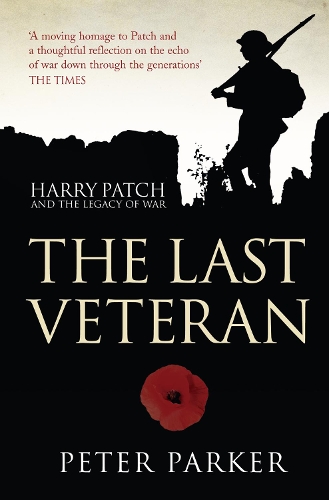
The Last Veteran: Harry Patch and the Legacy of War
(Paperback)
Publishing Details
The Last Veteran: Harry Patch and the Legacy of War
By (Author) Peter Parker
HarperCollins Publishers
Fourth Estate Ltd
22nd February 2011
United Kingdom
Classifications
General
Non Fiction
European history
940.3
Physical Properties
Paperback
336
Width 129mm, Height 198mm, Spine 20mm
240g
Description
This moving and timely book explores the way the First World War has been thought about and commemorated, and how it has affected its own, and later, generations.
On 11 November 1920, huge crowds lined the streets of London for the funeral of the Unknown Warrior. As the coffin was drawn on a gun carriage from the Cenotaph to Westminster Abbey, the King and Ministers of State followed silently behind. The modern world had tilted on its axis, but it had been saved. Armistice Day was born, the acknowledgement of the great sacrifice made by a whole generation of British men and women.
Now, almost a century later, Harry Patch, the last British veteran who saw active service, has died. Our final link with the First World War is broken.
Harry Patch was born in 1898 and was conscripted in 1916. He served with a Lewis gun team at the Battle of Passchendaele and in September 1917 was wounded by a shell that killed three of his comrades. After the war, Patch returned to Somerset to work as a plumber, a job he continued to do until his retirement.
The First World War was fought not by a professional army but by ordinary civilians like Patch, who epitomised Edwardian Britain and the sense, now lost, of what Britain stood for and why it was worth fighting for. The Last Veteran tells Patch's story, and explores the meaning of the war to those who fought in it and the generations that have followed. Peter Parker's illuminating and timely book is a moving tribute to a remarkable generation.
Reviews
To read Peter Parker's fine book on Harry Patch, The Last Veteran, is to see something of what the experience of the war created in one man; to see a kind of depth and human solidity shaped by the tragedy. Rowan Williams, Archbishop of Canterbury
Peter Parkers essential bookabsorbing and moving. TLS
'A fine work of research and historyThe ordinariness of [Harry Patch's] life serves the purpose of showing what stuff the heroes of 1914-18 were made of: but to an extent it also illustrates the disillusion that set in soon after the war was overHe became remarkable by living for so long. But what this account of his life, and the times in which he lived, really shows is that he and millions like him were remarkable long before that.' Telegraph
'The Last Veteran illuminates; it is full of fascinating detail, replete with irony' Guardian
'Peter Parker's homage to Patch is an occasion for thoughtful refection on our recent military history, the echo of the war down the generations and our sense of ourselves in the modern world.' Times
'Parker is a careful and thoughtful writer, and his book uses the spare materials of Harry's life as a springboard into wider and deeper waters'. Literary Review
'Peter Parker's new book on the last veteran may be the best yetIt comes closer to the essence of Patch than any number of well-meaning tributes to him published before and at the time of his death in late July. Which is quite a tribute to the London-based author Peter Parker, who had no idea who the last veteran would be when the bulk of his book was written.' Western Daily Press
'Absorbing and movingAs Peter Parker's essential book shows [Harry Patch and Henry Allingham's] death takes from us not just a human trace of the trenches but a living reminder that remembrance should be painful, unsentimental and monitory- or else it is not worth doing at all' TLS
Author Bio
Peter Parker was born in Herefordshire and educated in the Malverns, Dorset and London. He is the author of The Old Lie: The Great War and the Public-School Ethos (1987) and biographies of J.R. Ackerley (1989) and Christopher Isherwood (2004). He edited The Reader's Companion to the Twentieth-Century Novel (1994) and The Reader's Companion to Twentieth-Century Writers (1995), and was an associate editor of The Oxford Dictionary of National Biography (2004). He writes about books and gardening for a wide variety of newspapers and magazines and lives in London's East End.
